
What is the problem?
Until the full-scale invasion of Russia in 2022, the number of soldiers who started service in 2014 and participated in anti-terrorist operation in the east of Ukraine (ATO) gradually increased. The state and non-governmental institutions also slowly built their capacities to identify and solve the needs and problems that haunt ex-soldiers in everyday life. Today, these processes have accelerated significantly, so new challenges have appeared. After all, soon, as the Ministry of Veterans Affairs predicts, the number of citizens who will need various help — both former military personnel and families of fallen heroes — will increase manifold to at least four to five million people.
What is the solution?
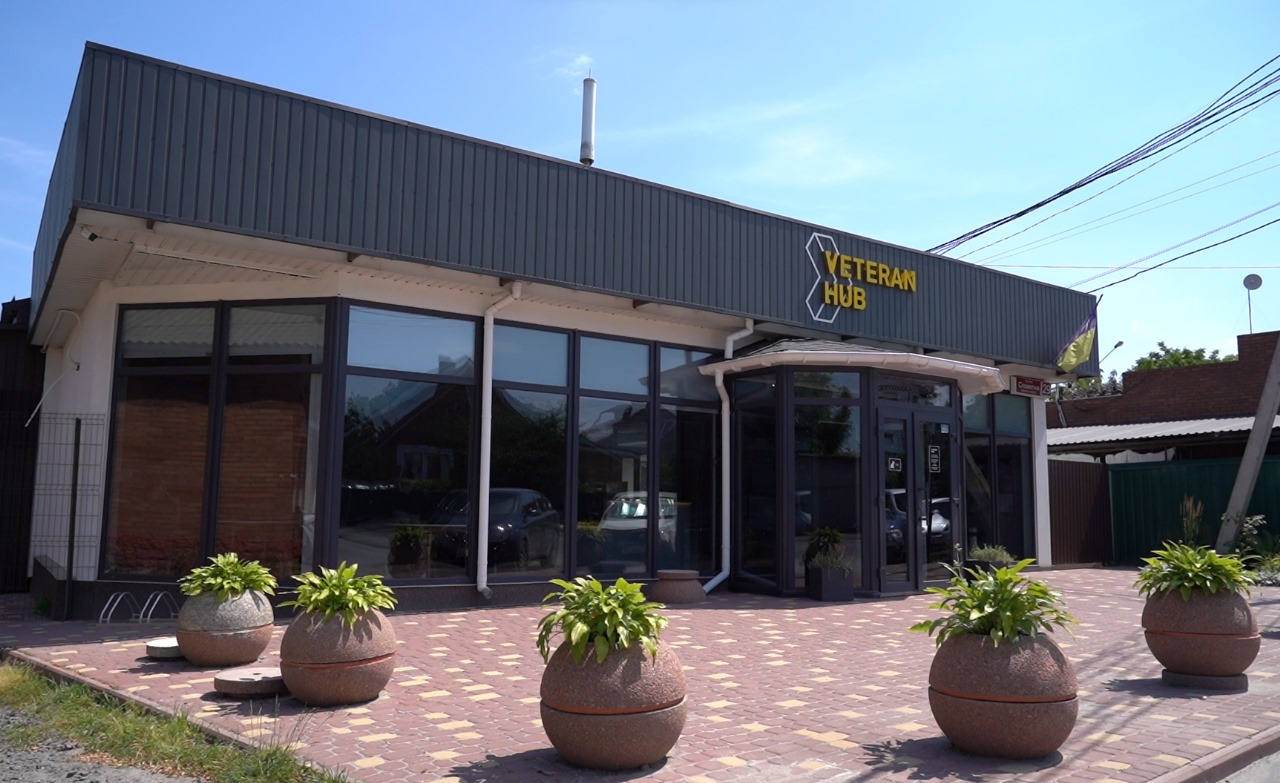
Veteran Hub in Vinnytsia
One of the practical solutions to the social care sector's problem is the development of already existing local initiatives to the scope of a specific network. For example, as it happens with Veteran Hub, a well-known brand of veteran spaces in Ukraine and abroad.
The first such hub was opened in Kyiv in 2018, and two years later, similar spaces began operating in Vinnytsia and Dnipro. Regional offices work with the same target audience and with uniform approaches. Still, currently, there is an obvious need to launch such hubs not only in regional centers or large cities but also in communities where the formation of large veteran communities is expected.
The problem will only grow, and it is better to start working on it sooner than later. The Veteran Hub branch in Vinnytsia, which received its first visitors in September 2020, already has the experience of such scaling.
How does it work?
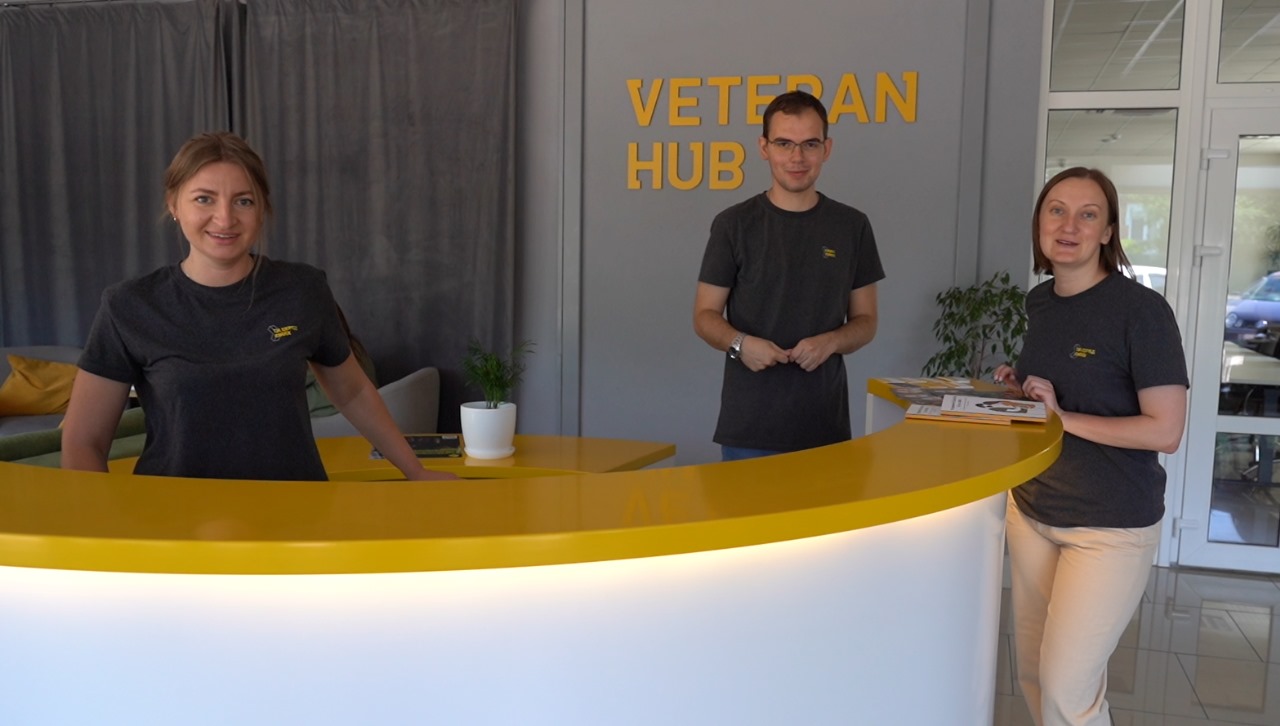
Hub consultants meet customers.
First of all, it is important how people are met here. Everyone who enters this bright and spacious office is immediately immersed in a warm atmosphere of friendliness and attention, which completely unobtrusively envelops and helps the guest to quickly get rid of complexes and establish mutual trust.
The reception is in the middle of the guest hall, with communication areas on both sides. There is a lounge location where consultants work. These are lawyers and case managers, psychologists, and job search specialists. In the coffee zone, you can refresh yourself with a hot drink. There is also a small library where visitors can borrow books to read. Everything works on trust. Separate rooms are provided for training and more confidential communication.
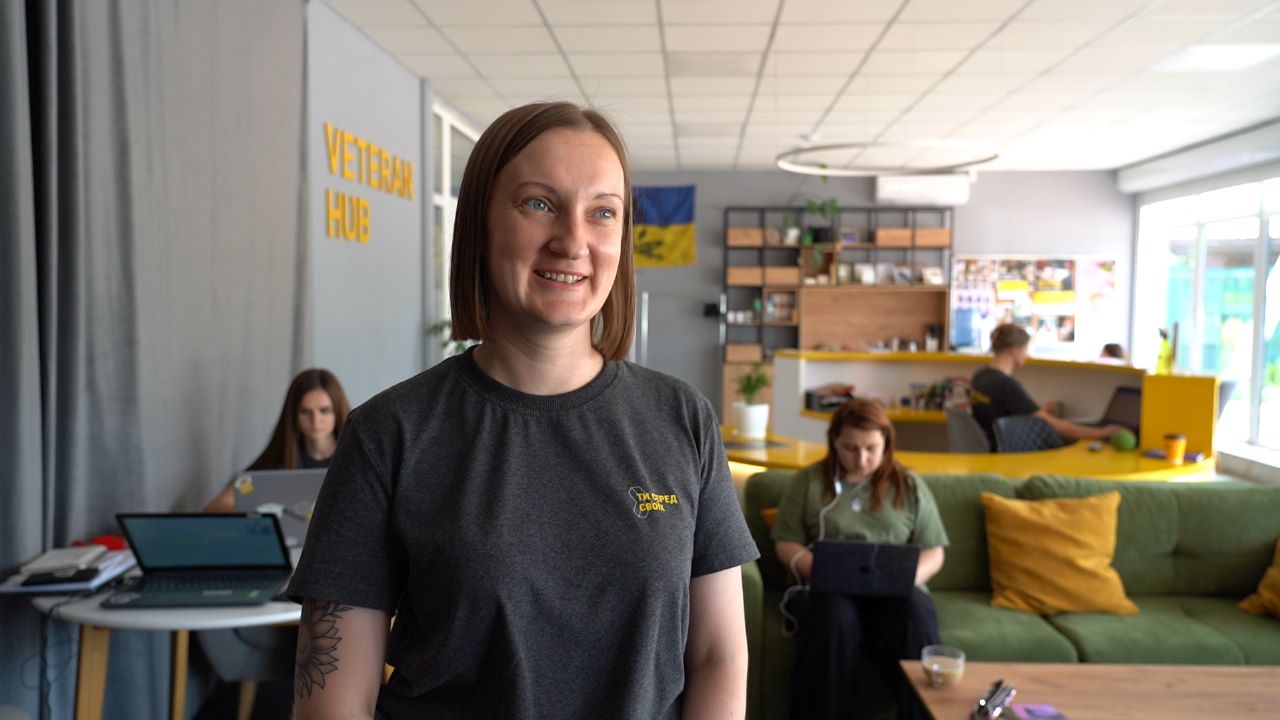
Anastasia Bunych is the head of the Vinnytsia Veteran Hub.
"Our team brought the books here — it's something like bookcrossing, a process where a person, having read a book, leaves it in a public place so that others can read it, too. Among the books, there are also gifts from various projects and contributions from publishing houses. For example, a fairly significant batch came from Our Format — that's cool and engaging literature," says Anastasiya Bunych, the head of the Vinnytsia Veteran Hub, who also left some of her own books for visitors to use.
The hub's target audience is veterans, soldiers, their families, and loved ones, family members of those who died in the war or are in captivity. To everyone who comes to the hub, there is an individual approach and the search for the best possible help so the client resolves the issue with which they came.
Who and why comes to the hub?
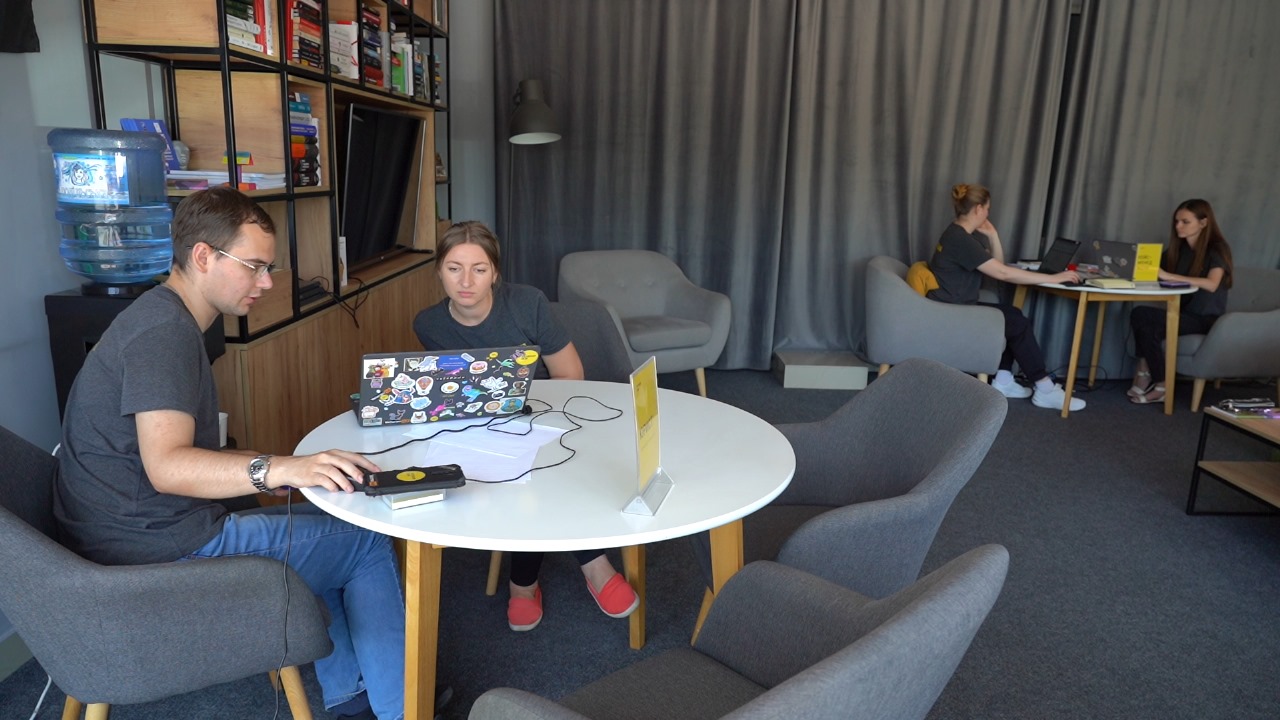
Veterans come to the hub both for consultations and to spend time with like-minded people.
People come to the hub when they need support or legal or psychological advice or when looking for a job. Many people also come just to chat, to meet for coffee with fellow soldiers. In addition, they visit the hub to work in a co-working space. At a time when there were power outages in autumn and winter due to the Russian shelling of Ukrainian electricity infrastructure, Veteran Hub provided a generator and a reliable internet connection, so a lot of people gathered in the hub, which became a kind of a point of invincibility — an island of safety, stability, warmth, and unity in the event of an emergency power outages.
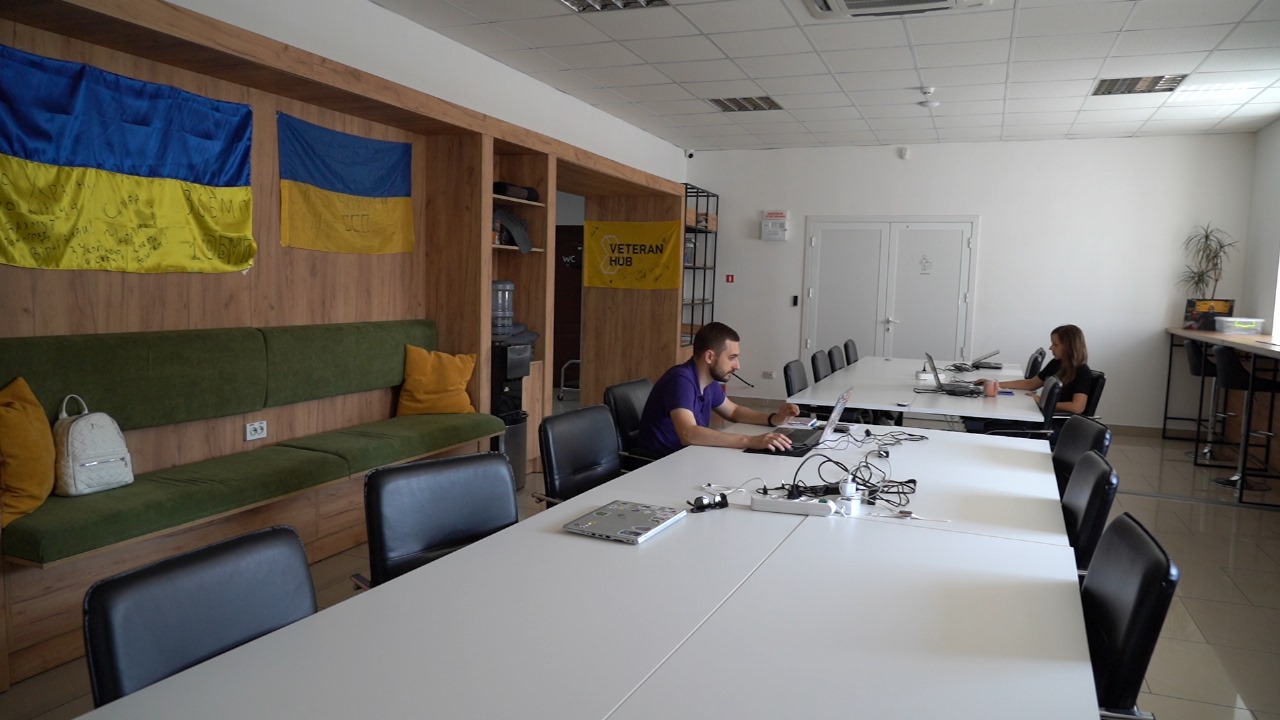
Everywhere, there are battle flags with numerous signatures donated by visitors. Flags were left to the consultants as a souvenir, adding to the familiar fraternity atmosphere for most visitors.
Who can apply for support?
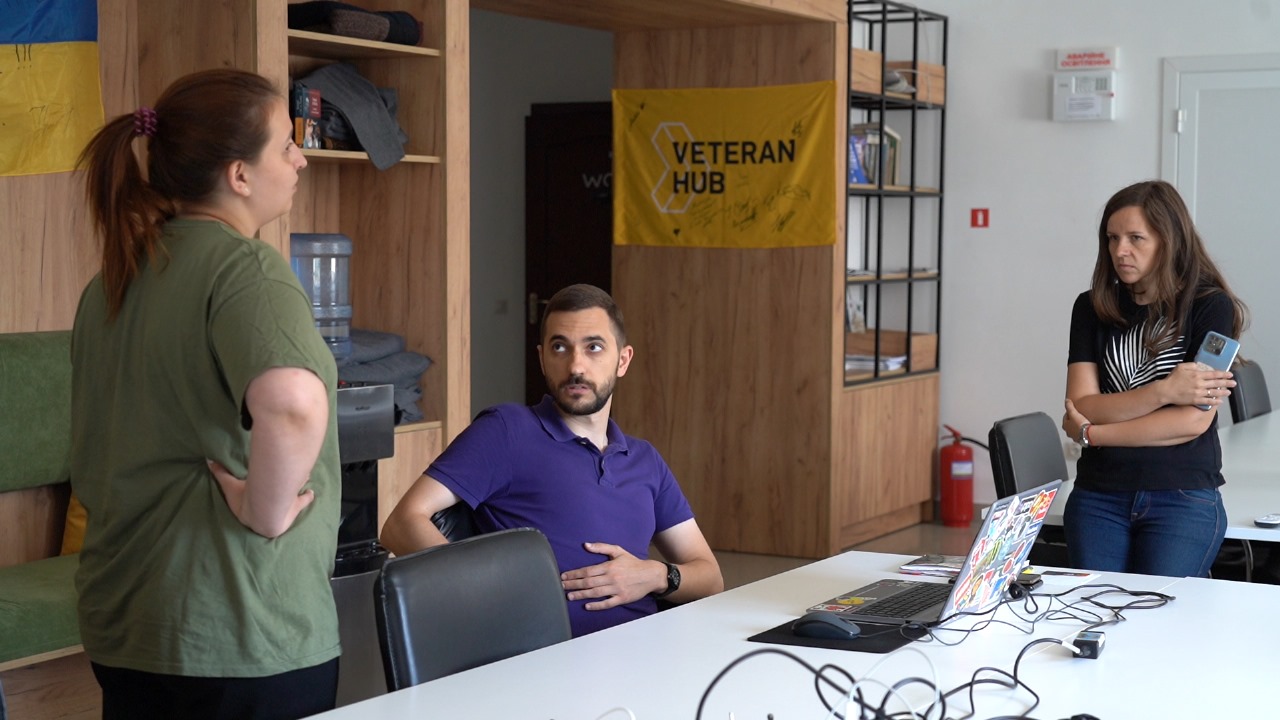
In the Vinnytsia hub.
Hub consultants work for:
- veterans,
- spouses and partners, children and loved ones of veterans,
- families and close to military personnel,
- soldiers of the National Guard of Ukraine, the Ministry of Internal Affairs, the State Border Guard Service, the State Emergency Service,
- doctors and volunteers.
The main resource of the institution's activity is a charitable fund that works on a grant basis and donors who finance projects.
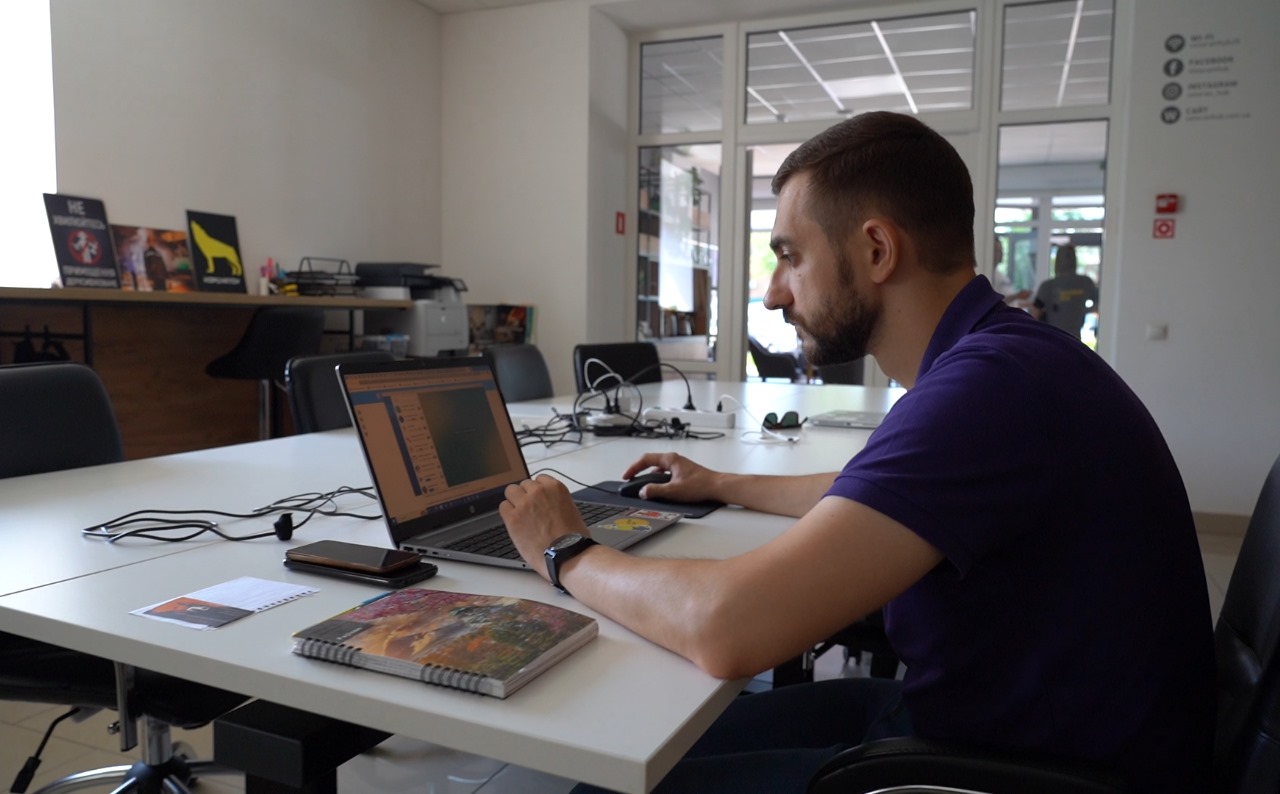
In the Vinnytsia hub.
The large Veteran Hub team is engaged in the creation of projects and research, mainly in Kyiv, but some initiatives are implemented in Vinnytsia as well. Among them are The Way of a Veteran, The Way of a Beloved Warrior, Military Experience in a Resume, and others.
Bunych is convinced there is no competition between veteran spaces in Ukraine, as they all work for the same people. She adds that when people can migrate between veteran spaces, they have the opportunity to choose, and this encourages teams to develop.
How do the veterans find out about the hub?
The team actively works in social networks, in places where our target audience can be, and distributes handouts. They also interact with structures and organizations that also work for veterans. A very effective means of communication is the so-called word of mouth, when information about the hub comes from people who have been here and received a certain service or attention. "It means they like it here. In addition, we have a mobile office team that travels around the region and provides the same services as here in the space in the city. The mobile hub works from Tuesday to Saturday for veterans and families of soldiers," explains the head of the Vinnytsia Veteran Hub.
You can call the team vie phone.
How to prepare for large waves of demobilization?
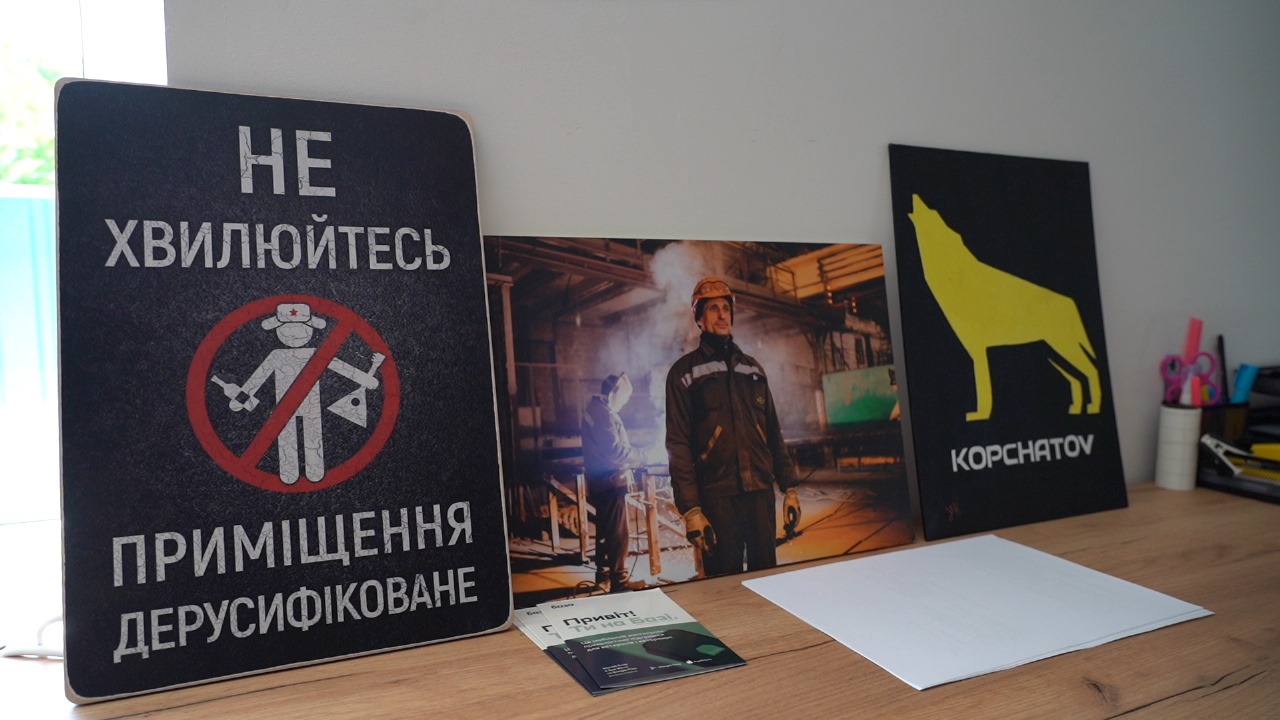
In Vinnytsia Veteran Hub.
Bunych is also a veteran. She notes that the number of soldiers is also increasing due to the wider access of women to various military professions and roles.
"I think veteranism is still a more common experience of men and women, not something different. Yes, girls have their own needs and individual characteristics, just like every person. However, productivity in war does not depend on gender but on motivation, professionalism, responsibility, and other human qualities," Bunych continues. "We also try to provide really special support to the wives and loved ones of our soldiers who are fighting. For this, a separate group works in the hub in the format of a communication circle based on the principle of equal to equal. They communicate with each other and their own experiences. The coach there is our psychologist, who, in the process, seeks to provide support tools and advice. We have created many support groups in the online version as well, particularly for families of fallen heroes, veterans, and families of missing soldiers," says the head of the Vinnytsia Veteran Hub.
She clarifies that here, they always make sure that every visitor feels comfortable and feels that they are important because, among the issues that the hub deals with, there are no trivial ones. The hub's team knows how to maintain confidentiality.
Veteran Hub is preparing for a large wave of demobilized people because then there will be significantly more customers. Here, they are improving work methods and learning new approaches. For example, within the scope of the HR-practice project, there is active cooperation with companies of various sizes that will employ veterans or have mobilized workers. Webinars are held with managers, HR specialists, and leaders to effectively adapt soldiers in labor groups after returning from military service and war. There is a constant demand for such collaboration because companies understand that veterans, of whom there will be a lot, should be accommodated with some needs. For this, you need to be able to work with them and understand what to pay attention to so that this return seems comfortable for the demobilized.

Vinnytsia Veteran Hub is just one experience of building veteran spaces. Ukraine needs even more such experiences, and they should consider proven successful practices and the normative and methodological field that veteran policies and programs place. But it is obvious that after Ukraine's victory, the whole country should become a solid veteran space — comfortable and worthy of Ukrainian defenders!
Photo: Vitaliy Sudarkin







